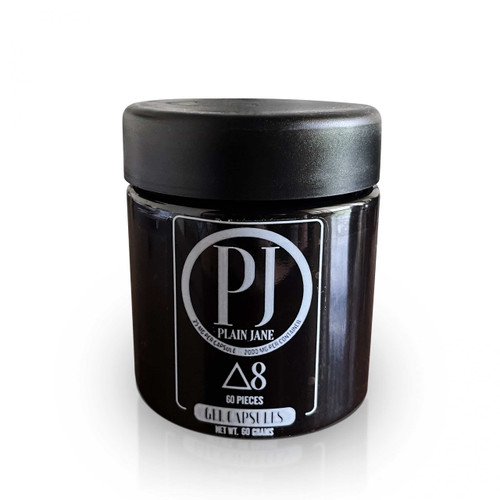-

1 Oz Small Delta 8 Buds
$43.99 -

Delta-8 THC Hemp Filtered Pre-Rolls
$14.99 - $129.00 -

Delta 8 Flower Prerolled Joint
$7.99 - $69.99 -

Delta 8 Gummies
$16.99 - $57.99 -

Eighth Pack Delta 8 Hemp Prerolled Joints
$25.99 -

Delta 8 Sour Hawaiian Haze Hemp Flower
$7.50 - $123.99 -

60 Count - 25 mg Delta 8 THC Gel Capsules (1500 MG)
$56.99 -

Delta-8 THC Hemp Filtered Pre-Rolls (3-Count)
$4.99 - $75.00 -

10 Count - 25 mg Delta 8 THC Gel Capsules (250MG)
$12.50 -

Delta 8 Sour Space Candy Hemp Flower
$7.50 - $123.99 -

Delta-8 THC Cannatarts
$9.99 - $86.00 -

Delta 8 CBG Hemp Flower
$7.25 - $123.50 -

Full Flavor D8 CBG Fortified Trim
$12.99 - $34.99 -

Delta 8 Spearmint Gum
MSRP: $17.99$13.99 -

Delta 8 THC Drizzillz
$13.99 - $47.99 -

Delta 8 Hemp Tincture
$25.99
Plain Jane Delta-8 THC Products
What Is Delta-8-THC? Delta-8-THC is a hemp-derived cannabinoid similar in structure to Delta-9-THC but with milder effects. Found in small quantities in cannabis plants, it can be synthesized from CBD and is federally legal when derived from hemp containing less than 0.3% Delta-9-THC.
Delta-8 vs. Delta-9 The primary difference lies in the placement of a double bond in their chemical structure, which affects how each interacts with the body's endocannabinoid system (ECS). Delta-8 creates a weaker bond with CB1 receptors, typically leading to a smoother experience.
Delta-8 vs. CBD CBD is non-psychoactive and interacts with the ECS differently than Delta-8. While both are derived from hemp, Delta-8 may have more noticeable effects.
Types of Delta-8 Products
-
Vape Cartridges & Disposables: Fast-acting and easy to use.
-
Edibles (Gummies): Slower onset, longer-lasting effects.
-
Tinctures: Quick absorption when used sublingually.
-
Flowers, Pre-rolls & Blunts: Smokeable options with different strain profiles.
Dosing Delta-8 Start low—typically 10-20mg—and increase gradually as needed. Onset time depends on the method: inhaled products act faster than edibles.
Legality Delta-8 derived from hemp is federally legal under the 2018 Farm Bill. However, individual states may have restrictions. Please check your local regulations.
Drug Testing Delta-8 may trigger a positive drug test since most tests detect THC metabolites, not the specific variant.
How to Use Delta-8
-
Flower: Grind and roll or use in a pipe.
-
Carts: Attach to a compatible vape battery.
-
Tinctures: Place under tongue and hold before swallowing.
-
Gummies: Eat and wait for effects.
Why Choose Plain Jane Plain Jane offers a wide variety of third-party lab-tested Delta-8 products. We ensure transparency, quality, and compliance.
Shipping Policy We ship Delta-8 products within the U.S. and eligible territories. Shipping typically takes 1-3 business days from dispatch. Express options available.
Note: This product is not intended to diagnose, treat, cure, or prevent any disease. Use responsibly. Not for use by individuals under 21. Consult your healthcare provider before use if you are pregnant, nursing, or on medication.


